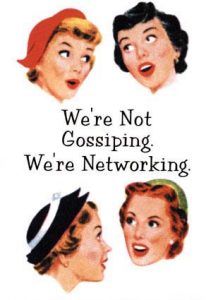 The obsession called Gossip
The obsession called Gossip
We are obsessed with gossip. From items like who’s doing what, who’s wearing what, who’s dating whom, who’s making how much money, who’s eloped with whom, why somebody is in the job, why somebody is out of job, why somebody got promotion, who is suffering from which disease, we want to gossip without break. People visit social functions like marriage, engagements, parties, etc just to meet friends and opportunity to gossip. We all forget that while words have the power to destroy, they also have the power to heal. It all up to us whether to destroy or heal!
 Gossip is casual or unchecked conversation about other people, typically involving details which are not confirmed as true. It is idle talk or rumor especially about personal or private affairs of others. Gossip has been researched in terms of its evolutionary psychology origins. This has found gossip to be an important means by which people can monitor cooperative reputations and so maintain widespread indirect reciprocity. Indirect reciprocity is defined here as “I help you and somebody else helps me.”
Gossip is casual or unchecked conversation about other people, typically involving details which are not confirmed as true. It is idle talk or rumor especially about personal or private affairs of others. Gossip has been researched in terms of its evolutionary psychology origins. This has found gossip to be an important means by which people can monitor cooperative reputations and so maintain widespread indirect reciprocity. Indirect reciprocity is defined here as “I help you and somebody else helps me.”
Gossip has many synonyms such as chat, yak, scuttlebutt, gab, dish, and chewing the fat. It is also called the grapevine. We describe it as ‘the word of mouth’ – sometimes straight from the horse’s mouth. All those TV channels, news papers gossip columns, social sites flourish on the pedestal of gossip!!
 Robin Dunbar, an evolutionary biologist views gossiping as an aid to bonding in large groups. Anthropologists have long assumed that language developed in relationships among males during activities such as hunting. Dunbar’s original and exceptionally appealing studies suggest otherwise: that language in fact evolved in response to our need to keep up to date with friends and family. We needed conversation to stay in touch, and we still need it in ways that will not be satisfied by teleconferencing, email, letter, or any othe
Robin Dunbar, an evolutionary biologist views gossiping as an aid to bonding in large groups. Anthropologists have long assumed that language developed in relationships among males during activities such as hunting. Dunbar’s original and exceptionally appealing studies suggest otherwise: that language in fact evolved in response to our need to keep up to date with friends and family. We needed conversation to stay in touch, and we still need it in ways that will not be satisfied by teleconferencing, email, letter, or any othe r communication technology. As Dunbar shows, the impersonal world of cyberspace will not fulfill our elemental need for face-to-face contact. Now isn’t this a fact? Don’t we crave to meet our friends personally, so to catch up with all those news? What happens when we meet in person the facial expressions and body language fill in the gaps, those in between lines which are not spoken deliberately.
r communication technology. As Dunbar shows, the impersonal world of cyberspace will not fulfill our elemental need for face-to-face contact. Now isn’t this a fact? Don’t we crave to meet our friends personally, so to catch up with all those news? What happens when we meet in person the facial expressions and body language fill in the gaps, those in between lines which are not spoken deliberately.
With the advent of the internet gossip is now widespread on an instant basis, from one place in the world to another what used to take a long time to filter through is now instant – in a jiffy that it. Things go viral today. The small video clips (at times morphed), emails, sms, networking sites like WahtsApp, Twitter, face book you name it; if you love gossiping things are at your fingertips these days.
And why do we gossip? When people are feeling bad about themselves, they sometimes think they’ll feel better if there were people worse than them. The easiest way for them to make sure someone else is on the bottom is to make up a rumor that puts somebody down. And, if everybody else is gossiping or spreading rumors, you might feel you have to do the same thing in order to fit in the group; because we all need this “sense of belonging”. When you’re “in the list of people knowing the secret,” you’re in the group. Sadly, the person who the gossip or rumor is about is obviously left out of the group.
worse than them. The easiest way for them to make sure someone else is on the bottom is to make up a rumor that puts somebody down. And, if everybody else is gossiping or spreading rumors, you might feel you have to do the same thing in order to fit in the group; because we all need this “sense of belonging”. When you’re “in the list of people knowing the secret,” you’re in the group. Sadly, the person who the gossip or rumor is about is obviously left out of the group.
Gossip hasn’t always been considered a bad word. The word gossip first meant godparents or a familiar acquaintance and was used to describe someone who told of a family’s news and developments. In Shakespeare’s time, a gossip was also someone who sat with a woman through childbirth, perhaps to talk, offer comfort, or to help her pass though the labor pain.
 Gossipers always want attention. Their attention seeking need is so high that they can go to any extent – may be criticizing/maligning somebody’s image. Some people always want to be in control and at the top of the ladder. When people are at the top of the popularity scale, or are determined to climb higher, one way they do this is by reducing the popularity of the person, the so called “status” of him/her to pull them down. Spreading rumors and gossip is one of the main ways people reduce another person’s status. These days, we see men are leading women in spreading rumors. Marilyn Monroe said “when it comes to gossip, I have to readily admit men are as guilty as women”.
Gossipers always want attention. Their attention seeking need is so high that they can go to any extent – may be criticizing/maligning somebody’s image. Some people always want to be in control and at the top of the ladder. When people are at the top of the popularity scale, or are determined to climb higher, one way they do this is by reducing the popularity of the person, the so called “status” of him/her to pull them down. Spreading rumors and gossip is one of the main ways people reduce another person’s status. These days, we see men are leading women in spreading rumors. Marilyn Monroe said “when it comes to gossip, I have to readily admit men are as guilty as women”.
Another reason to gossiping is jealousy. If you’re jealous of someone’s looks, popularity, or money, you might gossip about that person in order to hurt him or her. If you feel that someone’s done something bad to you, or deserves to be hurt, making up a rumor might satisfy your sense of justice.
Some people get immense happiness in spreading rumors especially sometimes, a period where everyone is happy and getting along just seems kind of-dull. Spreading some juicy rumors might shake things up a bit. All those tabloid newspapers and TV shows full of celebrity gossip are pure proof that rumors are a popular form of entertainment.
along just seems kind of-dull. Spreading some juicy rumors might shake things up a bit. All those tabloid newspapers and TV shows full of celebrity gossip are pure proof that rumors are a popular form of entertainment.
 Can we stop gossiping? Most people would be horrified at the idea of being called a ‘gossip monger’ and terrified to be caught talking behind someone’s back. We usually don’t mean to talk about others but we do because we aren’t thinking! The first step in ridding your life of gossip is to be aware of it.
Can we stop gossiping? Most people would be horrified at the idea of being called a ‘gossip monger’ and terrified to be caught talking behind someone’s back. We usually don’t mean to talk about others but we do because we aren’t thinking! The first step in ridding your life of gossip is to be aware of it.













































